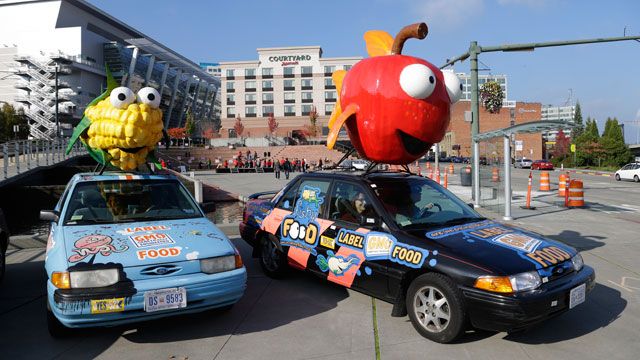
Today is Election Day and outside money is flooding campaigns in small towns and big cities across the country in amounts not seen in past off-year elections.
The New York Times points to the cash that the billionaire Koch brothers have thrown into local races to help sway voters in Iowa, Kansas, Ohio and Texas.
In Coralville, Iowa (population: 20,000), the Koch brothers’ Americans for Prosperity (AFP) jumped into the race to elect the town’s next mayor and city council with an aggressive campaign — including direct mail, newspaper advertising and knocks on doors — focused on the tiny town’s finances.
It’s just one local race AFP has tried to swing — often with success — since the Citizens United decision in 2010.
In January, the group successfully fought an increase in a food and beverage tax in Fremont, Neb. And last spring, it opposed a tax increase in Gahanna, in central Ohio. [Coralville] voters rejected the tax measure in May, but the City Council has put it back on Tuesday’s ballot.
Tim Phillips, the national president of Americans for Prosperity, said the organization could have a real effect on local races, where it does not have to deal with all the Washington special interests. The main reason “we fight local issue battles is because they result in good policy outcomes, generally promoting economic freedom via less taxes, less government spending,” he said.
And it’s not only the rich guys on the right flooding campaigns with cash, as Politico reports. During the 2012 campaign season — one in which ideological tycoons like Sheldon Adelson spent hundreds of millions of dollars on campaigns, wealthy donors in the center and on the left seem to have taken a “if you can’t beat them, join them” stance on special interest money.
In the off-year campaigns of 2013, liberal and Democratic interests have enjoyed a decisive advantage in the billionaire spending bracket. Indeed, groups tied to just three billionaires — New York City Mayor Michael Bloomberg, California investor Tom Steyer and Facebook founder Mark Zuckerberg — have spent well more than $25 million this year pushing progressive candidates and causes. Their arrival on the political scene, at the same time as many conservative donors remain disheartened from the GOP’s 2012 defeat, represents a shift in power in the arena of big-money campaigns. And it’s the clearest sign that Democrats have abandoned their initial revulsion about outside money in favor of a recognition that they have to play and win by the same political rules as their opponents.
A case in point is the campaign in Virginia, where the Democratic candidate Terry McAuliffe has, according to The New York Times, pulled in more than $34.4 million, giving him a significant cash advantage over Republican rival Ken Cuccinelli, who raised $19.7 million this cycle. Here’s what the New Republic had to say about that:
Big-ticket donors to the Democrats, like their conservative analogues the Koch brothers and Sheldon Adelson, have begun to embrace PAC-giving with a true vengeance. Michael Bloomberg and Mark Zuckerberg (neither a traditional Democrat, but mostly left-leaning) have each started their own. Bloomberg’s PAC, targeting gun issues, will spend $3 million in Virginia alone by Election Day, while hedge funder Tom Stayer’s group, NextGen Climate Action, has also been a significant force in the raise on McAuliffe’s behalf.
Democrats have argued that their billionaire PAC-givers stand to benefit less directly from the candidates’ victories than do donors like the pragmatic Kochs, and while that’s certainly true for something like Bloomberg’s gun efforts, it’s less true for Zuckerberg’s immigration-reform push and probably for Stayer’s interest in a certain kind of green-tech governor. There are new ways of giving money in politics, but very few new motivations for doing so. As Cucinelli reminded The New York Times, McAuliffe once gleefully wrote in his memoir that it was easy to fundraise for gubernatorial races, because there were just so many meaningful favors a governor can hand out.
And in Boston, as The New York Times reported, money has come “pouring” in over the last few days in the city’s first competitive mayor’s race in three decades. Martin Walsh, a state representative backed by organized labor, has received about three times the donations of John Connolly, who has received money from education groups. Over the weekend, Connolly said the new influx of money will make his opponent beholden to the interests of unions.
“My opponent is a good man, but you can’t have $2.5 million pour in from across the United States on behalf of labor unions and say you’re going to be able to be independent,” Mr. Connolly said, his voice rising, as he addressed about 80 supporters at a restaurant in the Hyde Park neighborhood. “And,” he said, by now screaming, “you can’t have a ‘super PAC’ form four days before the election and have $500,000 dumped into it on your behalf and say you’re not going to owe anybody a thing after the election.”
Walsh defended himself, saying it was “wrongheaded” to suggest he wouldn’t be independent. Either way, it seems that outside money has helped shape the candidates’ messaging. Analysts following the campaign there say that voters know one main fact about each candidate — that Mr. Connolly is the “education” candidate and that Mr. Walsh is the “labor” one. This is of course wonderful news to anyone who wants a few wealthy individuals to essentially decide the outcome of our elections, both big and small.
And not necessarily wealthy people from the local community. In Washington state, the Seattle Times reported that out of a total of $22 million raised to oppose a proposal to label genetically modified food, just $550 (!) came from sources within the state.
It’s a phenomenon that has rarely been seen here on such a large scale. But in this unusual year, with several nationally watched issues on the ballot and few big-ticket campaigns in other states, the influx of outside cash is arising in different ways, including in local races dominated by out-of-city or out-of-county funding. Political insiders and experts said the pattern could threaten the core promise of the initiative process and representative democracy itself — that citizens get to decide the laws that govern them and politicians who represent them.
Thankfully, there’s a bright spot in all of this that comes to us from California, which has one of the strongest disclosure laws in the country.
Last year, officials at the state’s Fair Political Practices Commission suspected that millions in contributions were given to two right-wing political campaigns by donors who obscured their identity. After a year-long investigation, now comes the fun part.
A few days ago, as part of a civil settlement, the state imposed $16 million in penalties and fines on the groups, a record in a campaign finance case. Though it’s not clear how much of those penalties will ever be collected, or even who many of the original donors were, the effort demonstrates the importance of state disclosure laws and aggressive enforcement, particularly since Congress has refused to pay attention to abuses on a national level. The California commission, in fact, has done the political world a favor by exposing the secretive network of conservative groups that have aggressively taken advantage of the unlimited donations allowed by the Supreme Court, as well as the ability to hide donors that is permitted by the Federal Election Commission and lower courts.
Thank you California for a bit of hope in the post-Citizens United world.
Tonight, we’ll see if these ‘investments’ by wealthy donors actually pay off for them on Election Day. But one thing is already clear: even in smaller races and local ballot initiatives around the country, big money is distorting our democratic process.


